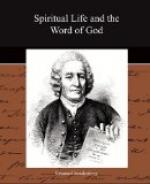That the Sabbath represented that union and the holy acknowledgment of it, has been fully shown in the Arcana Coelestia, namely, that the “Sabbath” signified in the highest sense the union of the Divine itself and the Divine Human in the Lord, in the internal sense the conjunction of the Lord’s Human with heaven and with the church, in general the conjunction of good and truth, thus the heavenly marriage (n. 8495, 10356, 10730). Therefore the rest on the Sabbath day signified the state of that union, because the Lord then has rest; also through that union there is peace and salvation in the heavens and on the earth. In a relative sense it signified the conjunction of man with the Lord, because man then has peace and salvation (n. 8494, 8510, 10360, 10367, 10370, 10374, 10668, 10730). The six days preceding the Sabbath signified the labors and combats that precede union and conjunction (n. 8510, 8888, 9431, 10360, 10667). The man who is being regenerated is in two states, the first when he is in truths and by means of truths is being led to good and into good, the other when he is in good. When man is in the first state he is in combats or temptations; but when he is in the second state he is in the tranquillity of peace. The former state is signified by the six days of labor that precede the Sabbath; and the latter state is signified by the rest on the Sabbath day (n. 9274, 9431, 10360). The Lord also was in two states: the first when He was Divine truth and from it fought against the hells and subjugated them, the other when He was made Divine good by union with the very Divine in Himself. The former state was signified in the highest sense by the six days of labor, and the latter by the Sabbath (n. 10360). Because such things were represented by the Sabbath, it was the chief representative of worship, and the holiest of all (n. 10357, 10372). “To do work on the Sabbath day” signified to be led not by the Lord but by self, thus to be disjoined (n. 7893, 8495, 10360, 10362, 10365). The Sabbath day is not now representative, but is a day of instruction (n. 10360 at the end). (A.E., n. 965.)
IV. The Fourth Commandment
The fourth commandment of the Decalogue is that parents must be honored.
This commandment was given because honor to parents represented and thus signified love to the Lord and love toward the church, for “father” in the heavenly sense, that is, the Heavenly Father, is the Lord; and “mother” in the heavenly sense, that is, the heavenly mother, is the church; “honor” signifies good of love; and “length of days,” which such will have, signifies the happiness of eternal life. So is this commandment understood in heaven, where no father but the Lord is known, and no mother but the kingdom of the Lord, which is also the church. For the Lord gives life from Himself, and through the church He gives nourishment. That in the heavenly sense no father in the world can be meant, and indeed, when man is in a heavenly idea, can be mentioned, the Lord teaches in Matthew:




